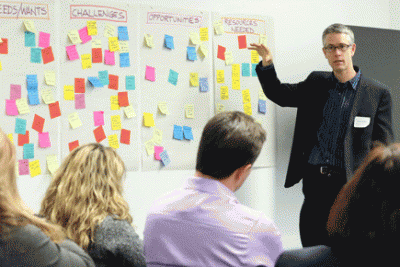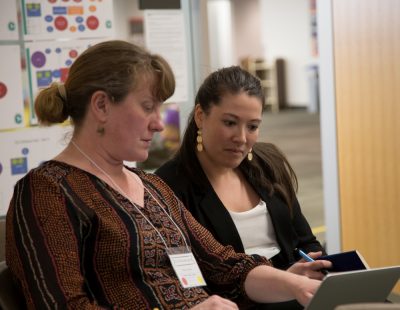Story by Nicole Bedford, CFICE Project Manager and Communications Coordinator and podcast by Kate Higginson, CFICE Communications Research Assistant
When it comes to making community-campus engagement (CCE) more equitable, a small policy change by a college or university can make a huge difference. This was the experience of the Community First: Impacts of Community Engagement (CFICE) project when their host institution, Carleton University, decided to change how it interpreted and implemented its travel policy.
Listen to the podcast below, or continue scrolling to read the full story! Download a PDF of the podcast transcript.
Prior to 2016, CFICE participants were expected to pay up front for their travel costs. Travelers could then submit their receipts for reimbursement after their travel took place. While Carleton’s travel policy allowed for other means of travel funding to be distributed, having travelers submit expense claims after travel was a way of ensuring the university remained accountable to its grant funders.
“The university as a Public Institution is obligated to account for every dollar spent for any grants it receives. Government funding often carries additional restrictions,” explains Genevieve Harrison, CFICE Project Administrator. “The easiest way for an institution to do this is to only release money after proof can be provided for how that money has been spent. This puts the burden of financial accountability on the traveler.”
Depending on the travel requirements, the costs to CFICE participants could sometimes be well over $1,500. For CFICE members with limited financial flexibility, like students and some community partners, carrying this expense burden for weeks or even months after travelling was extremely challenging, and perpetuated a power imbalance that went against CFICE’s community-first focus.
“The original policy interpretation impacted our ability to equitably include community voices in our project planning,” states Peter Andrée, CFICE Principal Investigator (PI). “While we ensured community voices were present at meetings through technology like Skype, it wasn’t ideal. For a community-first CCE project, we can’t afford to not have community partners at the table.”
Changing how Carleton University implemented its travel policy didn’t happen overnight. Instead, it took months of deliberation by a special committee of university representatives. In late 2016, Carleton’s Research Accounting office updated its interpretation of the travel policy, granting Carleton and associated individuals the ability to apply for travel bursaries under select circumstances.
Unlike travel expense claims, travel bursaries are granted based on travel estimates. They can therefore be provided to individuals in advance of travel to cover costs up front. This change has had a big impact on the ability of CFICE to remain true to their mandate of being community-first. For example, the bursary has meant a stronger presence of community partners at CFICE events where project decision-making takes place.
“The bursary [available for the CFICE Community Impact Symposium] meant more of our community partners could actually attend to help us interpret the data and shape the recommendations. That event changed how we planned to share our research results, which will help us reach more people in the long-run,” says Andrée. The impacts of this policy change haven’t just been felt at a project level. CFICE individuals have benefitted too.
“Support through the travel bursary created an opportunity for me to participate in a national conversation about CCE,” explains Colleen Christopherson-Cote, Community Co-lead of CFICE’s Evaluation and Analysis Working Group. “Without this support I would never be able to manage travel and participation in multiple events in Ottawa. In return, my expertise and community voice would not be included as easily in the dialogue at the CFICE table. Including, and resourcing, opportunities for equitable community participation is at the heart of the Community First approach.”
This bursary is a start in addressing the costs to community partners of participating in CCE, but one significant downside is that the bursary is taxable, reducing the full amount of reimbursement that participants receive. Moving forward, it is important to keep trying to find even better resource solutions for communities. As Andrée notes, it’s often the little changes that can have far-reaching impacts on community-campus engagement work.
As Andrée reflects, “This experience with Carleton University’s travel policy is a reminder that when institutions are more community first in their policies and practices, even in small ways, this can have a big impact on how they serve their communities.”
Become more community-first!
To learn more about how to make your work more community-first, check out our list of actions for all community-campus engagement practitioners!

